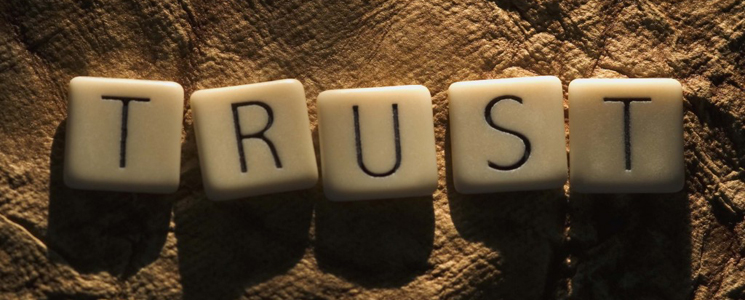
Trust feels wonderful and lack of trust feels terrible.
Most often I see improv trust in the relationships between performers, which is determined, of course, by past experiences that no longer mean anything. Someone who trusts me as a fellow performer will improvise with me differently than they improvise with someone they don’t trust as a fellow performer. I will let that person down, from time to time, but because I’ve built a lot of “past performance” trust, it’s “That’s cool man, didn’t work this time.”
The person they don’t trust, however, just can’t do anything right. Every time they are let down by someone they don’t trust, it’s “OF COURSE they just destroyed that. OF COURSE they did.” This is all just personal judgment, and my preference is to not allow that to come into the equation at all.
Every scene is a new scene. Every show is a new show. Every moment is a new moment. A decision shouldn’t be made about how much to trust the people you’re improvising with, you just keep your set point at full trust. And if you are let down again? Full trust again. And let down again? Full trust again. Does this sound difficult? Impossible? That’s all on you, bro. It’s solely up to you to give trust, it’s not up to your fellow improviser to gain it back. And what if you don’t want to? Well, that’s the problem.
For me, my toolbelt is made up of -Be Present- -Be Playful- -Be Confident- and my improv suit is made from the fabric of -Trust-.
Trust in improv extends WAY beyond just interpersonal trust between players. It extends to trusting that the lights will come down when they need to, or trusting that the scene won’t be victim to an ill-timed edit, or trusting that the scene WILL get edited when it needs to be, or trusting that the audience will “get it” and you don’t have to over-explain yourself, or trusting that the audience is with you even when they are quiet, or trusting that the scene doesn’t need to be saved by a super funny 3rd character entry. My bottom line here, folks, is that as improvisers it serves us to trust and it limits us to distrust. It can feel risky to give trust so unconditionally but I promise it pays off huge in scenic possibilities, for the health of the show, and in on-stage relationships.
Freeze Tag is an excellent example of an improv game built on trust. Freeze Tag two people are in a scene and get frozen by an offstage improviser who comes in and takes a player out and starts a brand new scene. Sometimes this game will be a collection of scene snippets, lasting no longer than three lines before another FREEZE is called and a new scene snippet starts. (Sidenote: three line freeze scenes are FINE, but not if every freeze scene is three lines. Variety is key.) If all the scenes are frozen after three lines it becomes apparent that there is a lack of trust at work. Individuals in the group start to believe that if they DON’T call FREEZE early in the new scene they won’t get a chance to get into the game, because EVERYONE is calling FREEZE early to get into the game. There is no consideration for the fact that maybe the audience was really enjoying the beginning of that scene and maybe it had some legs to run on; instead the trust deteriorates and it’s every improviser for themselves. This doesn’t happen all the time. Hardly. But when it DOES happen, it’s glaringly obvious that no one trusts anyone else to allow a scene to progress.
This can happen in long-form improvisational pieces too, but Freeze Tag is a great example of a short-form game where you can SEE THE TRUST. Beyond the calling of FREEZE from scene to scene, you’ll see distrusting improvisers initiate even when they aren’t the ones tapping into the scene. “They didn’t say anything when I thought they should have, so I just started talking.” TRUST that your scene partner will make an offer. The scene isn’t going to play out like you expect; be okay with that.
I said something cool once in a workshop, on accident I bet, and I’ll put it here because it ties into trust. Don’t have expectations, have anticipations. Anticipating what your scene partner may do is a wonderful tool and mindset, while expecting what they will do invites your scene partners to continually disappointment you.
How is it, do you think, that some improvisers who have never met can take the stage for an improv set and come away with an inspiring piece of theatre full of moments of deep trust and support? Are they just that good? Good improvisers have learned to trust unconditionally and it leads them to being able to improvise with anyone.
Mutual trust, shared between scene-partners in improvisation will lead to magical, glorious, unexpected improv moments. Trust yourself. Trust your scene partners. Trust silence. Trust unlocks the doors of possibility; distrust makes it seem like there are no doors and the scene stays in the room.
· · ·